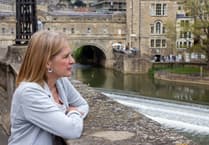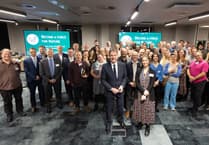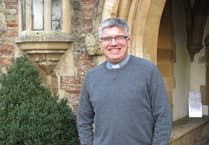A business-owner in Midsomer Norton is challenging others in the town to take a long, hard look, not only at the amount of plastic they may be using, but to consider the damage it is causing to the environment and make big changes as a result.
An hour with Sean Dudden, who sells and repairs antiques, is enough to make anyone look really closely at the paths that we would obliviously walk along every day. He shows me that within the detritus of the pavement are tiny pieces of plastics, microplastics – as well as an alarming amount of rubbish, mostly plastic bottles and wrappers. In the river around the town, behind hedgerows, in ditches – it is everywhere. And this is just our little corner of the town.
Sean, who has travelled the globe and always cared about the planet, has begun a Facebook group called ‘A Life WithoutPlastic’, which allows a network and support group to discuss their plastic-free journey – giving advice, information and tips about ways to cut out plastic altogether.
It is a non-political group, and already has members worldwide – from Sri Lanka, India, Malaysia, France and the US. In under a week, he gained just under 200 members with over 3,500 comments and posts, and Sean hopes to grow this into a movement which will help orchestrate real change and keep the conversation around plastics going, both locally and nationally.
He said: “I was born in 1970, of a generation that used the milkman, had glass bottles and bars of soap. It’s about getting back to using these products, rather than relying on plastics, which are doing so much damage to our environment, and who knows what it is doing to our health? This isn’t scaremongering – it is really serious.
“The aim of this group is to educate people on their use of plastic, and to make them aware of their own personal plastic waste – most of which ends up in the environment.”
According to Ocean Conservancy, every year, eight million metric tons of plastic enter our ocean, on top of the estimated 150 million metric tons that currently circulate in our marine environments. They compare it to dumping a New York city rubbish truck full of plastic into the ocean every minute of every day for an entire year. A scary statistic.
From whales with stomachs full of plastic to tiny plankton ingesting microplastics, the problem is affecting marine life and humans alike. This was highlighted recently on Hugh Fearnley-Whittingstall and Anita Rani’s BBC One series, War on Plastic, which found a plastic bag from Wales in amongst the rubbish in Malaysia, and local families suffering health complaints from all of the rubbish being burned there.
Look closely, and you will find that plastic is everywhere, and Sean is joining the calls for better labelling of products, as exposed in the programme, with items such as face wipes, containing high levels of plastic, which do not break down, either in landfill or wherever they may end up being dumped – often entering our seas. Sean has even found an old intact Marathon bar wrapper, which could be older than 1990, when the brand changed to Snickers.
Sean is encouraging families and individuals, like those that lived on the street from Bristol that featured in the programme, to take a look at all of the plastic they are using – to reduce the use and then cut it out completely. He adds: “My aim is to blow open the staggering reality of the extreme plastic pollution that the world is experiencing. Unless the message is reinforced, many will simply forget and return to their normal routines, rather than seeking more ways to make positive changes.
“We don’t expect everyone to be able to completely change their habits, but if everyone could just think about the problem, and make even small changes, it would be a massive move in the right direction and would also add pressure on manufacturers to rethink their packaging solutions.
“It is about changing public attitudes to plastic, and long-term lifestyle changes that we can all adopt.”
Sean is one of a number of people in the community trying to make small changes in their corner of the world. The group, Plastic Free Chilcompton, also exists on Facebook, with users posting ideas of where to recycle crisp packets and a milk vending machine at Chilcompton Village Hall, installed by a local farmer.
Farrington’s Farm Shop has also joined the movement, which is now an eco brick drop-off point, and the company is looking at reducing packaging.
B&NES Council, which collects fifty tonnes of plastic recycling every week from households within the area, has also pledged to achieve plastic-free communities status by April 2020 – but it needs your help. The local authority is asking local businesses, organisations and schools to pledge to eliminate at least three single use items by next year. Readers can sign the pledge at: www.bathnes.gov.uk/services/environment/sustainability/bathnes-plastic-pledge
Readers can visit A Life WithoutPlastic via Facebook and also watch Sean’s video, which highlights the amount of plastic being thrown away along just one of many roadside verges, at least 96%, he estimates, was single use.
Join the conversation! Let us know of any initiatives that you are involved with locally. Email: [email protected]




